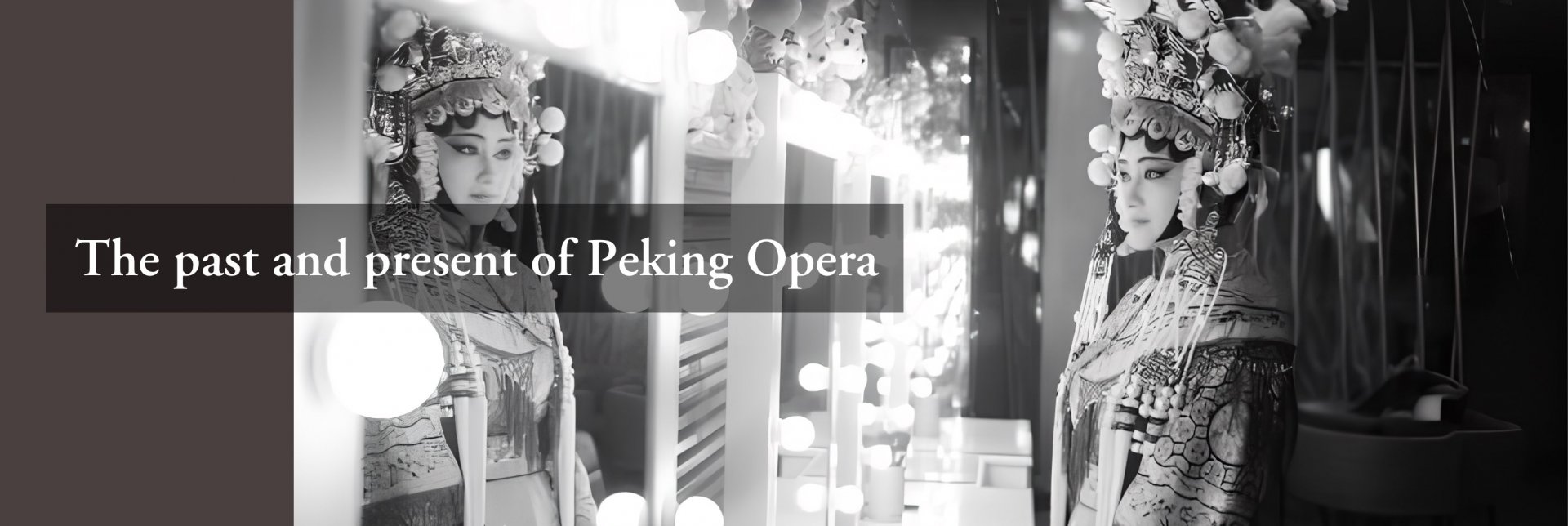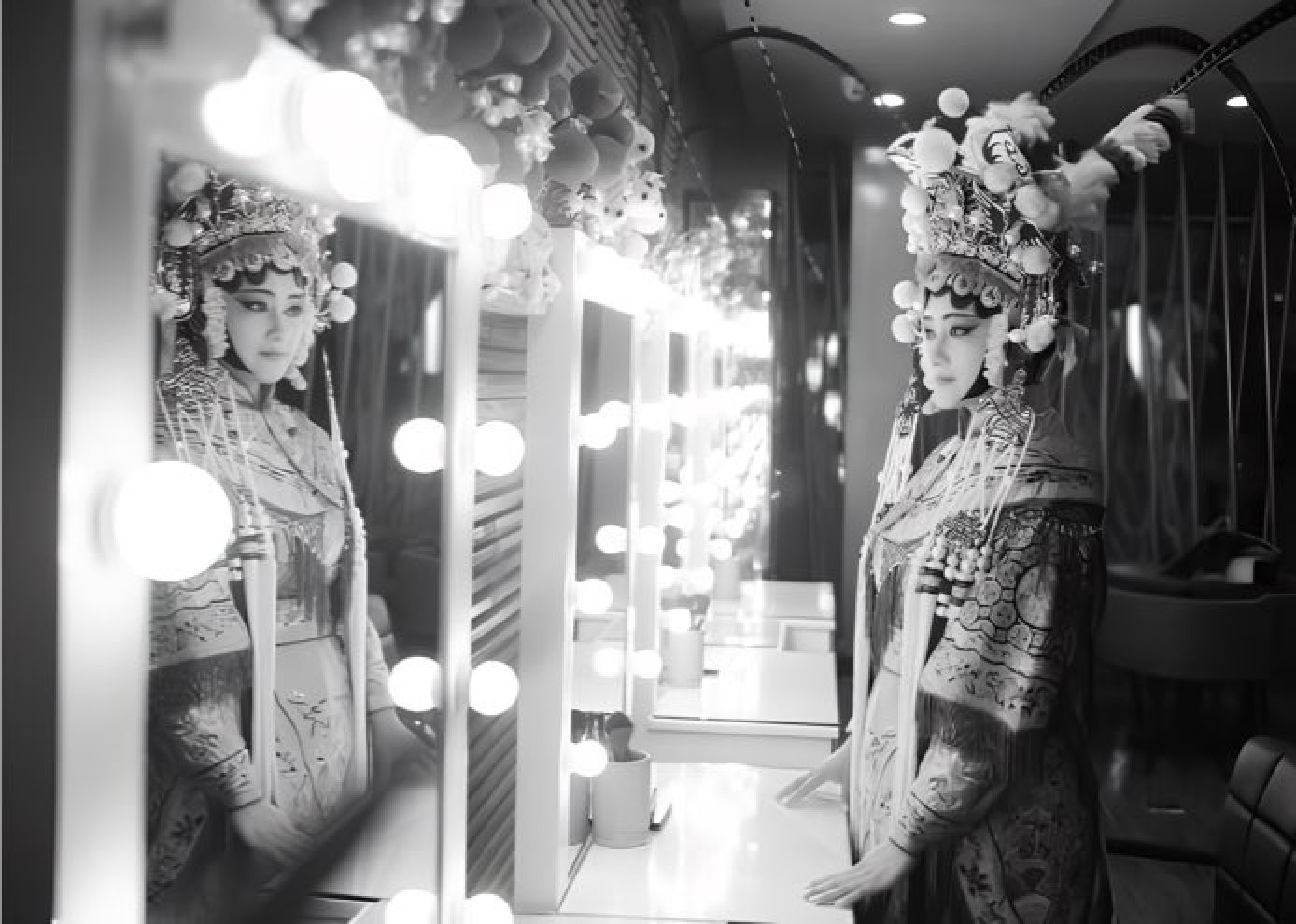The past and present of Peking Opera
Peking Opera, also known as "Jingxi"(京戲), "Ping Opera"(平劇)1 , "National Drama"(國劇), is a traditional Chinese drama and has a history of more than 200 years. On May 20, 2006, Peking Opera was approved by the State Council to be included in the first batch of national intangible cultural heritage lists. The development and evolution of Peking Opera has gone through three stages: traditional Peking Opera, modern Peking Opera, and revolutionary modern Peking Opera model dramas.
The development and evolution of Peking Opera
Traditional Peking Opera was formed in the early Qing Dynasty. In 1790, Qianlong's 80th birthday was called in a famous opera performance troupe "Sanqing" (三慶)in Yangzhou. Since then, many Hui troupe(徽班)has come to Beijing one after another. Among them, Sanqing(三慶), Si Xi(四喜), Chuntai(春台), and Hechun(和春)are the most famous. This is the famous "Four Great Hui Troupe "(四大徽班), which laid the foundation for Peking Opera. Later, they learned from the strengths of Kunqu(昆曲)and Beijing Vocal, which made Peking Opera gradually mature in performing arts.

The content of the traditional Peking Opera mostly expresses the historical theme, and the acting emperor's generals, talented and beautiful women. (Such as: "Farewell My Concubine"(霸王別姬), "The Concubine Drunk"(貴妃醉酒), "Empty City Plan"(空城計), "Silang Visit Mother"(四郎探母)). The accompaniment instruments are divided into two types, one type are: Jinghu(京胡), Jingerhu(京二胡), Yueqin(月琴), Sanxian(三弦), Suona(嗩吶), Sheng(笙)etc. and other type are: big gongs(大鑼), small gongs(小鑼), board drums(板鼓), single leather drums(單皮鼓), nao(鐃), bo(鈸)etc. In terms of scene layout, traditional Peking Opera rarely has unique scenes. Most of them are replaced by a table and two chairs, and each play is common. In terms of makeup: sheng(生), dan(旦), jing(淨), chou(丑), no matter which role is thick makeup, that is Lianpu(臉譜). Lianpu shows his personality, such as: red face indicates loyalty, black faces indicate rough, blue face indicates bravery, and big white faces indicate treacherous.

In the early period of the Republic of China, due to the consecutive melee of the warlords and social turmoil, Peking Opera fell into a low tide. Fortunately, the outstanding actors of Peking Opera appeared, such as: "Four Famous Dans"(四大名旦)2 and "Four Great actor "(四大鬚生)3, which made Peking Opera flourish again. At the same time, fashion dramas and actresses4 can also join the ranks of Peking Opera. This is undoubtedly a major innovation for traditional Peking Opera. This is the germination of modern Peking Opera.
During the "Cultural Revolution", Peking Opera became the object of suppression, and the actor was also regarded as " Monster "(牛鬼蛇神), Peking Opera's traditional repertoire is forced to stop, only 8 revolutionary model dramas can perform, namely: Peking Opera "The Taking of Tiger Mountain"(《智取威虎山》), "Harbor"(《海港》), "Red Lantern"(《紅燈記》), "Shajiabang"(《沙家浜》)5, "Raid on the White Tiger Regiment"(《奇襲白虎團》), the ballet "Red Detachment of Women"(《紅色娘子軍》), "The White-Haired Girl"(《白毛女》), Symphony "Shajiabang"(《沙家浜》). It can be seen that this is another great innovation of Peking Opera. The content of the revolutionary modern Peking Opera models mostly reflects reality, and focuses on acting workers, farmers, and People's Liberation Army. Joined Western instruments and ballet. In terms of scene layout, each scene will be changed to different scenes. The makeup of the actor is close to real life and light makeup, and the audience can see the appearance of the actor. In terms of singing, the rhythm is also brisk than traditional Peking Opera.
Both of modern Peking Opera and revolutionary modern Peking Opera models are "modern", so some people directly mix modern Peking Opera and revolutionary modern Peking Opera models. But it can be called "model" and of course have a special status, so modern Peking Opera is a transition of revolutionary modern Peking opera model dramas.
The value of Peking Opera
Peking Opera is known as the "national essence"(國粹), the reason is that Peking Opera is expressed through the four artistic methods of "sing, read, pose and fight"(唱念做打). It is also the four basic skills of performance. Sing(唱)refers to the singing; read(念)refers to the speak rhythmically; pose(做) refer to the dancing body movements; fight(打)referring to martial arts and rolling skills. Therefore, it is necessary to be called a performer, and we must be well-educated and trained in military exercises.

The audience is also an expert. They watch the show and know more about the show, so they also have certain opera cultivation. They watch the show, not watch the storyline, but the skills of the actor. As in the movie "Farewell My Concubine"(《霸王別姬》), while the master trained his apprentices saying, "People must watch Chinese Opera", "If you don't watch Chinese Opera, you’re not a human. Pigs and dogs, they don't watch Chinese Opera." Because of cultural accomplishment, audience can understand the show. When who will appear and which actor will perform, the audience has already knew it. The outstanding actor, their eye expression and rolling skills, can win the applause of the audience, which is also an appreciate of the actor's skill. Unfortunately, this atmosphere can only appear in outdoor drama sheds. Now we are watching performances in the indoor theater. The audience can only veiled express their appreciation of the actors with applause. However, it is also good for performing in the indoor theater. Because there are electronic screens on the field, we can easily understand singing and dialogue, and there are English translations, and foreign audiences can also understand the meaning. The theater also has a microphone and audio to ensure that everyone in the field can hear clearly, and there are lighting equipment. The stage effect is greatly improved than before.

The decline of Peking Opera
Peking Opera has a unique connotation, precious and valuable, but in society, money is the most important, Peking Opera is difficult to get attention. In the section of the movie "Farewell My Concubine", Xiaolaizi(小癩子)and Xiaodouzi(小豆子)6 secretly go to the street. They had watched the performance of "Overlord" by chance, and they cry. Xiaolaizi(小癩子)is crying about the bitterness of life. He said, "How do they become the actor?", " How many difficulties to overcome ", "When can I be a actor?" Xiaodouzi(小豆子)cried because of perception. Xiaolaizi(小癩子) chose to give up, and Xiaodoizi(小豆子)chose to continue. Before Xiaolaizi(小癩子)commit suicide , he put all the candies into his mouth. This pleasure was his last hope for life. He faced hard practice every day. He felt that there was no way out. He was desperate. Nowadays, the society pays attention to success. What you pay attention to is proportional to the return of money. However, art requires long -term hard work to lay a solid foundation. Just like Xiaodouzi(小豆子)is born with good sounds and good figures, in addition, it also needs hard work day after day. But it is not guaranteed to have fame and fortune in the future. Although the status of the drama actor has now improved and is no longer considered as the vulgar profession, art still has been ignored. Without the boss's investment or government funding, the actor has no chance to perform at all. The opera performance is not popular now. If the fans depends on the orthodox performance, they have pay attention where the troupe perform. However, in case of special reasons, the troupe cannot go abroad for tour performances, and the public will lose the chance to watch the opera performance.
Note
1. 國民黨統治時期稱北京為北平,故稱「京劇」為「平劇」。
2. 1927年,北京《順天時報》評選京劇旦角名伶,梅蘭芳(1894-1961)、尚小雲(1900-1976)、程硯秋(1904-1958)、荀慧生(1900-1968)這四位,被評選成為“四大名旦”。
3. 四大鬚生為老生演員余叔岩(1890-1943)、高慶奎(1890-1942)、言菊朋(1890-1942)以及馬連良(1901-1966)。
4. 在此之前,京劇中的女角均是由男演員男扮女裝演出。
5. 翟文明編著:《圖說中國戲劇》(合肥:安徽科學技術出版社,2013年)。
6. 小豆子即年少時的程蝶衣(電影中由張國榮(1956-2003)飾演其成年形象)。
Reference
Book
徐城北:《中國京劇》(北京:五洲傳播出版社,2003年)。
徐潛主編:《中國戲曲藝術》(長春:吉林文史出版社,2014年)。
翟文明:《圖說中國戲劇》(合肥:安徽科學技術出版社,2013年)。
Movie
陳凱歌導演,張國榮、張豐毅主演:《霸王別姬》,北京電影製片廠,1993年。
All articles/videos are prohibited from reproducing without the permission of the copyright holder.




Welcome to leave a message:
Please Sign In/Sign Up as a member and leave a messageChi Seng Pun,謝謝!
小時候爸爸在家看「紅色娘子軍」DVD,我才接觸到。
#1
凱昕 孫
08-03-2023 13:45:45
孫博士,謝謝分享!
兒時,母親也帶我睇過「紅色娘子軍」,當時仍在澳門居住,睇這類戲,好像免費的。
#2
Chi Seng Pun
07-02-2023 14:45:34
孫博士,謝謝分享!
兒時,母親也帶我睇過「紅色娘子軍」,當時仍在澳門居住,睇這類戲,好像免費的。
#3
Chi Seng Pun
07-02-2023 14:45:33